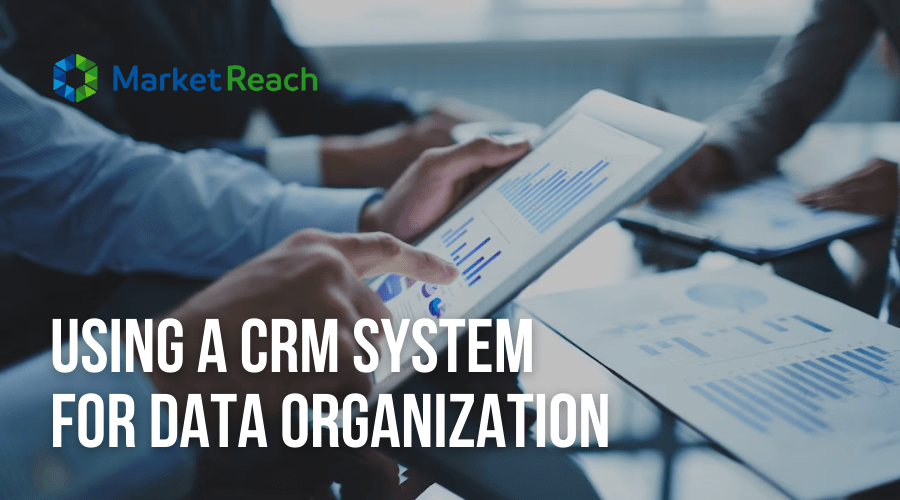
The Importance of Using a CRM System For Data Organization
Without an organized client relationship management (CRM) system, prospect qualification, lead generation, and every stage of the sales cycle would be complete chaos. This is especially true if you have multiple lead generators or sales reps working those same records. It’s important for there to be a way to streamline and organize the data collected during each stage of the sales cycle.
Having a CRM system in place is a great way to stay organized, make sure you are reaching the right prospects, capitalize on prior intelligence gathered, and make sure salespeople are not calling the same prospects simultaneously. Lastly, prospects will still remain even if the sales rep leaves. Don’t let the prospect notes disappear along with the rep! If you don’t already have a CRM system in place, consider the benefits that come with having one:
Improved Prospect And Customer Relationships
A CRM system is a great place to document notes from each call you have with a prospect. Having a place to keep detailed notes is important because it allows your lead generators or sales reps to make each conversation more personalized, thus building stronger prospect and customer relationships. According to Microsoft, 76% of respondents expect a rep to know their contact, product and service information/history before a conversation ensues. To ensure all information is correct and easily accessible, a CRM system is crucial.
According to Salesforce, it’s important to “find out what matters to your customers – their goals, challenges, and preferences – at the end of every exchange and make sure you have a follow-up action. Record these notes in your CRM system so the next time you can pick up exactly where you left off with a quick review.”
For example, let’s say you are trying to sell office furniture to small businesses and, during a qualification call, a prospect mentions that employees at their company love swivel chairs compared to stationary ones. Imagine the good vibes and positioning to close created on your follow-up call when you say, “During our last call, you mentioned that employees at your company prefer swivel chairs, so I found something that may fit in your budget, would you like to hear about it?”
Seamless Transitions Between Calls Made by Different Lead Generators or Sales Reps
Throughout the lifespan of the prospect’s sales journey, you may have multiple lead generators or sales reps working on any one given record. Of course, a one-call close makes this concept irrelevant, but we all know it can take months or years even, to close the sale. Since many people may be in contact with a single prospect, it is important that each person takes notes about the content of their call, so that there is a seamless transition between each conversation.
A CRM system serves as a great tool that all lead generators and sales reps can access and update at any point in time. This leads to increased efficiency because each person does not have to spend as much time researching the prospect every time they make a call. In fact, according to Salesforce, “it won’t matter who it is that is currently assisting the prospect or customer, because they’ll be working from the same information. And given that CRM is cloud-based and accessible from any device with an internet connection, the communication benefits of mobile CRM are not limited to the office.”
In particular, a CRM system is a great way to track the opportunity on the pipeline, in notating a rating system for each prospect (such as A, B or C.) This tells the salesperson how much time should be invested in following up. If during a qualification call, you discover that a prospect is not a good fit for your product or service, that should be noted in the CRM so that other lead generators do not waste their time reaching out to them again.
Ability to Track Performance And Plan For The Future
CRM systems also serve as a great tool for tracking your company’s personal performance and goals. You can track every lead you generate and every deal you close and then compare these metrics to the key performance indicators (KPIs) your company uses to measure success.
Conveniently, many CRM systems, according to HubSpot, have built-in reporting features such as sales dashboards and reports, so that you can see how well your team is doing. This data can then be used to determine if your current approach is working or if you need to reevaluate your sales strategy.
If your company does not currently use a CRM system to stay organized and keep track of communication with prospects, now is the time to invest in one – it really is an investment that is worthwhile. The benefits include improved relationships with your prospects and customers, a seamless transition between calls made by different lead generators or sales reps and the ability to track performance and plan for the future.
Here at MarketReach, we use a CRM system to keep organized throughout the qualification and lead generation process and to ensure that every lead generator is knowledgeable and prepared for each call. By doing this, our staff generates the highest quality leads possible with deep intelligence about the prospect. If your company is ever in need of our B2B lead generation and appointment setting services, give us a call.
Comments are closed.